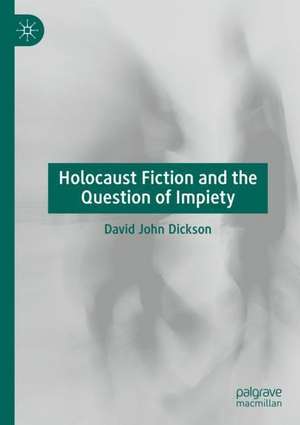Holocaust Fiction and the Question of Impiety
Autor David John Dicksonen Limba Engleză Hardback – 11 oct 2022
| Toate formatele și edițiile | Preț | Express |
|---|---|---|
| Paperback (1) | 637.13 lei 6-8 săpt. | |
| Springer International Publishing – 11 oct 2023 | 637.13 lei 6-8 săpt. | |
| Hardback (1) | 642.51 lei 6-8 săpt. | |
| Springer International Publishing – 11 oct 2022 | 642.51 lei 6-8 săpt. |
Preț: 642.51 lei
Preț vechi: 755.88 lei
-15% Nou
Puncte Express: 964
Preț estimativ în valută:
122.95€ • 127.03$ • 102.28£
122.95€ • 127.03$ • 102.28£
Carte tipărită la comandă
Livrare economică 19 martie-02 aprilie
Preluare comenzi: 021 569.72.76
Specificații
ISBN-13: 9783031123931
ISBN-10: 303112393X
Pagini: 264
Ilustrații: V, 264 p.
Dimensiuni: 148 x 210 x 21 mm
Greutate: 0.48 kg
Ediția:1st ed. 2022
Editura: Springer International Publishing
Colecția Palgrave Macmillan
Locul publicării:Cham, Switzerland
ISBN-10: 303112393X
Pagini: 264
Ilustrații: V, 264 p.
Dimensiuni: 148 x 210 x 21 mm
Greutate: 0.48 kg
Ediția:1st ed. 2022
Editura: Springer International Publishing
Colecția Palgrave Macmillan
Locul publicării:Cham, Switzerland
Cuprins
1. Introduction.- 2. Holocaust Synecdoche: Surrendering to the Simplifying Impulse.- 3. Second-Generation Fiction and the Legacy of the Hinge Generation.- 4. Visualising the Holocaust: Landmarks, Photographs and Post-Memory.- 5. Contemporary Fiction and Embodied Experience: Feeling the Holocaust.- 6. Between Irreverence and Impiety: Laying the Foundations for a Rosean Approach to Holocaust Representation.- 7. Conclusion.
Notă biografică
David John Dickson is a literature specialist, focusing on fiction relating to the Holocaust. He has previously published papers relating to the ethical representation of the Holocaust past – from Heather Morris’s presentation of gendered suffering, to the fictional representation of death in the gas chamber. He also has an interest in the history of the Jewish ghetto police, and has published a paper relating to the confessional diary of Calel Perechodnik.
Textul de pe ultima copertă
This book discusses the issues underlying contemporary Holocaust fiction. Using Gillian Rose’s theory of Holocaust piety, it argues that, rather than enhancing our understanding of the Holocaust, contemporary fiction has instead become overly focused on gratuitous representations of bodies in pain. The book begins by discussing the locations and imagery which have come to define our understanding of the Holocaust, before then highlighting how this gradual simplification has led to an increasing sense of emotional distance from the historical past. Holocaust fiction, the book argues, attempts to close this emotional and temporal distance by creating an emotional connection to bodies in pain. Using different concepts relating to embodied experience – from Sonia Kruks’ notion of feeling-with to Alison Landsberg’s prosthetic memory – the book analyses several key examples of Holocaust literature and film to establish whether fiction still possesses the capacity to approach the Holocaust impiously.
David John Dickson is a literature specialist, focusing on fiction relating to the Holocaust. He has previously published papers relating to the ethical representation of the Holocaust past – from Heather Morris’s presentation of gendered suffering, to the fictional representation of death in the gas chamber. He also has an interest in the history of the Jewish ghetto police, and has published a paper relating to the confessional diary of Calel Perechodnik.
Caracteristici
Highlights the inherent issues that limit the vast majority of fictional attempts to represent the Holocaust Features works of fiction spanning from 1961 to 2018 Argues that 'impious' victim-oriented Holocaust fiction is not possible at present
